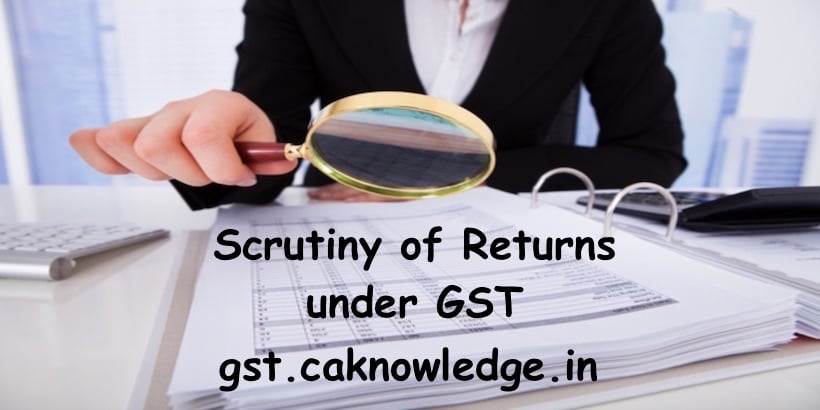Scrutiny of Returns under GST – Understand with 8 Questions Answered: This article explains Scrutiny of Returns as per Goods & Service Tax Act 2017. Deep analysis for what is the mean of Scrutiny of Returns, Time limit for issue notice for Scrutiny, Assessment of non-filers of returns, Assessment of unregistered persons etc…Here you may also check GST Applicability date, Impact of GST, Updates related to Scrutiny of Returns under GST Regime. Lets understand what is the Scrutiny of Returns under GST, Applicability of GST in GST Regime, GST rates, its impact on your business and latest updates about GST Act 2017. Now check more details for Scrutiny of Returns under GST Regime as per CGST Act 2017…
Scrutiny of Returns under GST
Q1. What does scrutiny of returns mean under CGST Act, 2017?
Ans. The CGST Act, 2017 empowers proper officer to scrutinise the return and related particulars furnished by the taxable person to verify the correctness of the return and inform him of the discrepancies noticed, if any, in a manner as may be prescribed.
In case of any discrepancies, the proper officer should seek explanation from registered person. On receipt of satisfactory explanation, the proper officer is not required to take any further action.
In the event, after accepting the discrepancies, no satisfactory explanation is furnished within a period of thirty days or such further extended time or if the taxable person fails to take the corrective measures in the return for the month in which discrepancy is accepted, the proper officer may initiate audit under Section 65 or special audit under Section 66 or inspection, search and seizure under Section 67 or proceed to determine the tax and other dues under Section 73 or Section 74.
Q2. Whether any time limit has been specified to issue notice for scrutiny?
Advertisement
Ans. No, the provisions relating to scrutiny assessments do not specify time limit for issuing notice for scrutiny of assessments.
Q3. What action may be taken by the proper officer in case no satisfactory explanation is sought after the discrepancies are bought to the notice of the registered person?
Ans. In case, after accepting the discrepancies, no satisfactory explanation is furnished within a period of thirty days or such further period as may be permitted, proper officer may:
- (a) Initiate Audit of accounts by the tax authorities under Section 65; or
- (b) Initiate special audit under Section 66; or (c) Initiate inspection, search and seizure under Section 67; or (d) proceed to determine the tax and other dues under Section 73 or Section 74.
Assessment of non-filers of returns
Q4. Whether, The CGST Act, 2017 provides for assessment in case of taxable person who does not furnish returns under Section 39 and 45?
Ans. In terms of Section 62(1) of the The CGST Act, 2017, the proper officer is empowered to assess the tax liability on such registered person to the best of his judgment taking into account all the relevant materials which is available or which is gathered and issue an assessment order within a period of five years from the date specified under Section 44 for furnishing of the annual return for the financial year to which the tax not paid relates.
Q5. Is there any additional opportunity provided for taxable person to submit a return even after passing an assessment order under Sec 62(1)?
Ans. Yes, if the registered person furnishes a valid return within thirty days from the date of service of best judgment assessment order under Section 62 (1), the said assessment order shall be deemed to have been withdrawn.
Q6. Whether the registered person will get immunity from interest & late fee leviable if assessment order passed under Section 60(1) is withdrawn?
Ans. No, registered person will still be liable for interest under Section 45 and late fee under Section 42
Assessment of unregistered persons
Q7. Whether, The CGST Act, 2017 provides for assessment of taxes on the unregistered taxable person who fails to take registration even though liable to do so?
Ans. If a taxable person fails to obtain registration even though liable to do so or whose registration has been cancelled under sub section (2) of Section 29 but who was liable to pay tax, the proper officer may assess the tax liability to the best of his judgement after providing opportunity of being heard to such person.
Q8. What is the Time limit for passing the assessment order on the unregistered person?
Ans. The proper officer, in relation to assessment of taxes on the unregistered taxable person, shall issue the assessment order within 5 years from the date specified under Section 44 for furnishing of the annual return for the financial year to which the tax not paid relates
Recommended Articles
